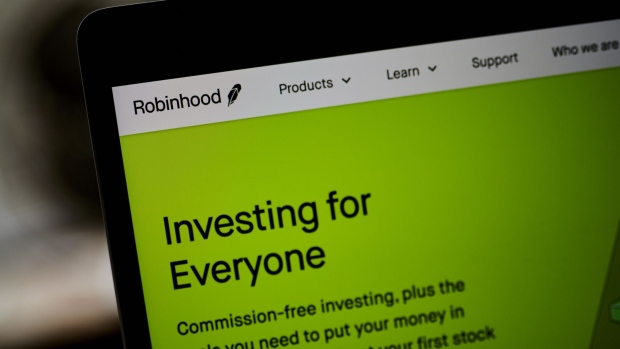Oct 27, 2021
Robinhood’s Safety Pitch Collides With Customer Meme Appetite
, Bloomberg News

(Bloomberg) -- Robinhood Markets Inc. Chief Executive Officer Vlad Tenev was clear in his message: the brokerage is about “safety first.”
As Robinhood executives sought to persuade Wall Street that the startup is finding its way to long-term stability, they swatted away concerns that meme trading and joke cryptocurrencies will determine its success.
The only problem for the newly public company is that memes and jokes are exactly what customers want. Robinhood, which played a central role in January’s retail-trading frenzy, is finding that pivoting to a more establishment approach can be difficult to balance while placating users buzzing about the latest investing fad.
“That’s a recipe for a major challenge,” said Hugh Tallents, senior partner at consulting firm CG42. “At the moment, the dream of low-end investors on-ramping and bringing more assets into the fold is not playing out.”
Tenev, 34, spoke with analysts after Robinhood reported a $1.32 billion third-quarter loss, mostly tied to stock-based compensation, and revenue that missed Wall Street estimates. That sparked a selloff, dragging the stock below its July initial public offering price and prompting analysts to ask where the company will look for growth.
Shares of Menlo Park, California-based Robinhood slumped 11% to $35.35 at 2:07 p.m. in New York.
The firm has high hopes for new products, including crypto wallets, that could help bolster its prospects. Such wallets allow users to send and receive digital currencies and hold non-fungible tokens. More than 1 million customers are waiting to sign up, Robinhood said.
But whether trend-chasing users will stick around for the wallets is an open question. In the three months through September, Robinhood’s average revenue per user tumbled 36% from a year earlier. Crypto-trading revenue plunged 78% from the preceding quarter, coinciding with waning interest in Dogecoin, a meme cryptocurrency that vaulted to a record in May.
Read more: Wells Notice? Whatever. Coinbase Is Still Paying Users 5% Rates
Dogecoin illustrates Tenev’s conundrum.
The only novelty crypto asset that Robinhood offers, Dogecoin comprised more than 62% of the firm’s second-quarter crypto transaction revenue. But Tenev’s safety-first approach has seen him shy away from adding other such coins, instead sticking with seven digital tokens the company believes won’t run afoul of regulators.
“We’re going to be very careful,” he told analysts late Tuesday. “We’re a regulated entity, and we’re hopeful to get some clarity soon on coins. So until then, we’ll continue to work with our regulators to hopefully land in a place where regulations allow for innovation and are applied evenly across the industry.”
Yet as Tenev spoke on CNBC last week, customers lit up a web chat with requests for Shiba Inu coin, the latest fad in crypto. Ahead of Robinhood’s earnings report, the top-ranked question from a retail investor was about timing on new cryptocurrency offerings, including the token tied to the Japanese hunting dog. So far, executives are resisting the demands.
“We have a pretty rigorous framework that we use internally to evaluate each coin,” Chief Financial Officer Jason Warnick said in a Bloomberg Television interview Tuesday. “We’ve looked closely at the coins we have, and we feel we are on absolutely solid ground.”
©2021 Bloomberg L.P.





